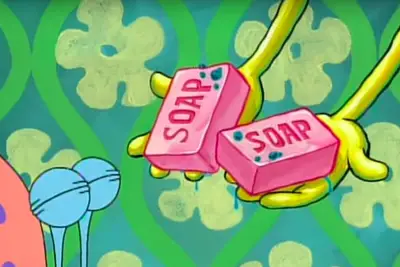Don't Drop The Soap: Reckoning With Male Rape Jokes in Pop Culture
There's a gendered double-standard to sexual assault, but you might be surprised by who's behind it.
TRIGGER WARNING: Sexual Assault, Rape, Non-consent
In a video essay posted to the Pop Culture Detective YouTube channel, media critic Jonathan McIntosh deep dives into pop culture's prevailing representations of sexual assault against men as comedy.
Divided across two half-hour videos, "Sexual Assault of Men Played for Laughs - Part 1 Male Perpetrators" and "Sexual Assault of Men Played for Laughs - Part 2 Female Perpetrators," McIntosh establishes a disturbing pattern behind the language and ideology of male sexual assault "humor."
The first video, which revolves around male-on-male rape and assault, compiles "Don't drop the soap!" jokes across everything from Adam Sandler movies to police procedurals to SpongeBob SquarePants. "Don't drop the soap!" is a joke premise so prolific that it barely even registers as a rape joke anymore. The danger here is strikingly obvious. By normalizing a rape joke to such an extent that most people don't even register it as a rape joke, we also normalize the sentiment behind it––that prison rape is okay, and possibly even deserved.
Watching scene after scene of pop culture "heroes" threatening criminals of the week or movie villains with the prospect of anal rape, it's impossible to ignore how weird it is that we, as a society, have seemingly decided that's okay. "You know how to play getting the dice," quips the always likable Ice-T to a suspect in an episode of Law & Order: Special Victims Unit.
"Here's how it goes. Your celly rolls the dice." At this point, Ice-T pulls out a pair of dice and rolls them. "Nine. That's how many days you get to play his girlfriend."
"DAAANG, Ice-T, that's cold," the show seems to expect you to say, without considering the implications of a police detective carrying around a pair of dice for the sole purpose of threatening men with the prospect of being raped. And sure, it's not exactly most people's first instinct to feel sympathy for someone who has been arrested on the suspicion of raping someone else in the first place, as tends to be the case on SVU.
At the same time, we need to recognize that in the real world, most of the men being victimized by prison rape are not necessarily rapists themselves; they're young, at-risk men, many of them gay or trans, who are locked up for myriad reasons including petty drug crimes. Moreover, regardless of why someone is locked up in the first place, rape is not a valid form of punishment in a civilized society; it's an act of revenge. If we're not okay with revenge killings from a legal standpoint, why are we so okay with prison rape?
Ultimately, prison rape jokes, along with the vast majority of male-on-male sexual assault jokes in general, hinge on the premise that being raped is an emasculating experience for men and that strong men emasculating weak men is funny.
On the other side of the same coin, while sexual assault of men by men is viewed as humorously emasculating, sexual assault of men by women is also largely viewed as funny and illegitimate.
McIntosh's second video distinguishes between men being raped or assaulted by traditionally attractive women and traditionally unattractive women. When the rapist is attractive, the jokes typically revolve around the idea that men are always horny and always want sex; so even if they were forced into doing something that made them uncomfortable, at least they still got laid.
More explicitly, rape at the hands of traditionally attractive women is viewed as a sexual fantasy, instead of...you know, a horrible rape. On the other hand, if the woman is "unattractive," the rape is a source of ridicule and hilarity, presuming that if the man really didn't want to have sex, he would have fought the woman off, so now he's just gross.
Of course, the real-world repercussions of all these jokes and normalization is that men are far less likely to report sexual assault and rape compared to women.
But before anyone complains that there's a double standard at play whereby women are taken seriously about rape and sexual assault while men aren't, it's important to understand who is behind this double-standard. The answer, surprisingly, is almost entirely other men.
If you comb through all of the "humorous" depictions of male sexual assault in media, across all variations of men raping men and women raping men, you'll discover that the vast majority of writers and directors behind "funny" rape scenes are men. Meanwhile, the majority of genuine critiques against this practice, including Samantha Bee's "Male Sexual Abuse Isn't Funny" PSA featuring Terry Crews on Full Frontal, writer Mika Doyle's in-depth 2016 critique of the depiction of male rape in pop culture on Bitch Media, and even academic articles on the topic in the Feminist Media Studies journal, follow a different pattern: The critiques are mostly coming from feminists.
But while it might seem obtuse, at first, to suggest that men are essentially subjugating themselves through rape culture while feminists are actively working to dismantle those conceptions, it makes a lot of sense when you think about it. The majority of men are not sex-starved animals who can only think with their hind brains, and any culture that accepts that notion is actively harmful to men, too.
Rape culture is extremely harmful to both women and men, and fighting back against rape culture benefits all genders.
We need to reassess the way we look at men being raped and assaulted, and that includes questioning the lazy male rape humor that's so prevalent in the media. More specifically, it's time for us to realize that if we actually care about the well-being of men who get raped, then we need to believe survivors, and if we believe survivors, that puts all of us on the same team.
